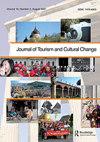How to deal with tourism constraints for seniors? Evidence from social tourism programmes
IF 2.5
4区 管理学
Q2 HOSPITALITY, LEISURE, SPORT & TOURISM
引用次数: 2
Abstract
ABSTRACT The article examines how tourism constraints for seniors are addressed through social tourism programmes. The research is aimed to (1) identify and (2) classify/categorise various adjustments in social torism programmes for seniors to determine the unique combination of adjustments that characterise social tourism programmes for seniors. Building on the hierarchical leisure constraints model [Crawford, D. W., Jackson, E. L., & Godbey, G. (1991). A hierarchical model of leisure constraints. Leisure Sciences, 13(4), 309–320. doi:10.1080/01490409109513147] the analysis intersects the three groups of constraints – intrapersonal, interpersonal and structural – with three strands of uncertainty faced by seniors – travel uncertainty, financial uncertainty and mobility uncertainty and corresponding social support adjustments: personal support mechanisms and instrumental support mechanisms. The proposed model shows that travel social support is of central importance for effectively negotiating the travel constraints in social tourism for seniors.如何应对老年人的旅游限制?社会旅游方案的证据
摘要本文探讨了如何通过社会旅游计划来解决老年人的旅游限制问题。该研究旨在(1)识别和(2)对老年人社会旅游计划中的各种调整进行分类/分类,以确定老年人社会旅行计划特有的调整组合。基于分层休闲约束模型[Crawford,D.W.,Jackson,E.L.,&Godbey,G.(1991)。休闲约束的分层模型。休闲科学,13(4),309–320。doi:10.1080/01490409109513147]该分析将三组制约因素(个人、人际和结构)与老年人面临的三股不确定性(旅行不确定性、财务不确定性和流动性不确定性)以及相应的社会支持调整(个人支持机制和工具支持机制)相交。所提出的模型表明,旅行社会支持对于有效协商老年人社会旅游中的旅行限制至关重要。
本文章由计算机程序翻译,如有差异,请以英文原文为准。
求助全文
约1分钟内获得全文
求助全文
来源期刊

Journal of Tourism and Cultural Change
HOSPITALITY, LEISURE, SPORT & TOURISM-
CiteScore
5.10
自引率
9.10%
发文量
31
期刊介绍:
Journal of Tourism and Cultural Change ( JTCC ) is a peer-reviewed, transdisciplinary and transnational journal. It focuses on critically examining the relationships, tensions, representations, conflicts and possibilities that exist between tourism/travel and culture/cultures in an increasingly complex global context. JTCC provides a forum for debate against the backdrop of local, regional, national and transnational understandings of identity and difference. Economic restructuring, recognitions of the cultural dimension of biodiversity and sustainable development, contests regarding the positive and negative impact of patterns of tourist behaviour on cultural diversity, and transcultural strivings - all provide an important focus for JTCC . Global capitalism, in its myriad forms engages with multiple ''ways of being'', generating new relationships, re-evaluating existing, and challenging ways of knowing and being. Tourists and the tourism industry continue to find inventive ways to commodify, transform, present/re-present and consume material culture. JTCC seeks to widen and deepen understandings of such changing relationships and stimulate critical debate by: -Adopting a multidisciplinary approach -Encouraging deep and critical approaches to policy and practice -Embracing an inclusive definition of culture -Focusing on the concept, processes and meanings of change -Encouraging trans-national/transcultural perspectives
 求助内容:
求助内容: 应助结果提醒方式:
应助结果提醒方式:


